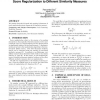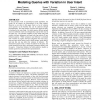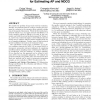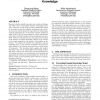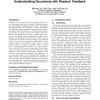SIGIR
2008
ACM
14 years 10 days ago
2008
ACM
Evaluation measures act as objective functions to be optimized by information retrieval systems. Such objective functions must accurately reflect user requirements, particularly w...
SIGIR
2008
ACM
14 years 10 days ago
2008
ACM
We present theoretical bounds and empirical robustness of score regularization given changes in the similarity measure. Categories and Subject Descriptors: I.5.3 Clustering: Simil...
SIGIR
2008
ACM
14 years 10 days ago
2008
ACM
Any given Web search engine may provide higher quality results than others for certain queries. Therefore, it is in users' best interest to utilize multiple search engines. I...
SIGIR
2008
ACM
14 years 10 days ago
2008
ACM
Question answering systems increasingly need to deal with complex information needs that require more than simple factoid answers. The evaluation of such systems is usually carrie...
SIGIR
2008
ACM
14 years 10 days ago
2008
ACM
In most previous work on personalized search algorithms, the results for all queries are personalized in the same manner. However, as we show in this paper, there is a lot of vari...
SIGIR
2008
ACM
14 years 10 days ago
2008
ACM
We consider the problem of large scale retrieval evaluation. Recently two methods based on random sampling were proposed as a solution to the extensive effort required to judge te...
SIGIR
2008
ACM
14 years 10 days ago
2008
ACM
Ranking algorithms, whose goal is to appropriately order a set of objects/documents, are an important component of information retrieval systems. Previous work on ranking algorith...
SIGIR
2008
ACM
14 years 10 days ago
2008
ACM
Research articles typically introduce new results or findings and relate them to knowledge entities of immediate relevance. However, a large body of context knowledge related to t...
SIGIR
2008
ACM
14 years 10 days ago
2008
ACM
Most traditional text clustering methods are based on "bag of words" (BOW) representation based on frequency statistics in a set of documents. BOW, however, ignores the ...
SIGIR
2008
ACM
14 years 10 days ago
2008
ACM
Comments left by readers on Web documents contain valuable information that can be utilized in different information retrieval tasks including document search, visualization, and ...

